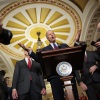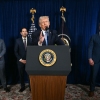New Zealand will increasingly disclose cases of Chinese espionage as part of a strategy to boost awareness in the country about the security threat, Prime Minister Christopher Luxon said.
Wellington wanted to increase vigilance across the business community about the threat — mirroring a strategy adopted by the US, UK, Canada and Australia, the premier added.
He said intelligence agencies were being more open about cases “to build literacy around it as an issue and threat”.
“Putting some light on these things and calling it out is actually necessary,” he told the Financial Times in an interview in Washington.
Luxon was speaking days after Wellington joined Washington and Canberra and others in accusing Beijing of conducting cyber attacks against Australia. In March, Luxon’s government said China had conducted similar attacks against New Zealand’s parliament in 2021.
The National party leader, who became prime minister in November, noted how the US had revealed intelligence about Russia building up forces before it invaded Ukraine, saying: “There’s a lot of power in that”.
Luxon was in Washington to attend the Nato summit where New Zealand, Australia, Japan and South Korea were able to join the event celebrating the alliance’s 75th anniversary. US President Joe Biden has been urging allies from the Indo-Pacific to attend Nato summits to boost security linkages as part of his strategy to counter China.
“Our view is very strongly that what happens in the Euro-Atlantic has an impact on the Indo-Pacific,” said Luxon, who pointed to the example of North Korea providing weapons to Russia as one serious concern.
Luxon, who hosted Chinese Premier Li Qiang this year, said he viewed China as a strategic competitor in the Indo-Pacific. However, he added that New Zealand was pursuing a balanced strategy. This involves co-operation in areas such as trade in dairy produce, collaboration on renewable energy, and expansion of people-to-people ties.
He said New Zealand would continue to develop trade with China as it strove to double its overall exports over 10 years. But he said he would not pull his punches when it came to criticising China if necessary, over fears of retaliatory economic coercion.
“When you believe in values, you actually need to stand up for them,” the prime minister said.
Luxon said he was very concerned about the Second Thomas Shoal in the South China Sea. In recent months, China has used aggressive tactics to try to block the Philippines from resupplying troops on the Sierra Madre, a ship marooned on the reef. China asserts sovereignty — a claim rejected by an international tribunal in 2016.
“It’s very important for us that international law is upheld. Freedom of navigation is important for a trading country like us,” said Luxon, who added that China must uphold its obligations under the UN Convention on the Law of the Sea.
Luxon said Wellington hoped to complete a “status of visiting forces agreement” with Manila this year that would allow New Zealand to deploy military assets to the Philippines. Japan recently concluded a similar agreement.
The US is encouraging its allies to work more closely together as part of its China strategy. In April the US, Australian and Japanese militaries concluded their first ever joint exercises with the Philippines inside its exclusive economic zone, in a move designed to send a strong signal to China about its aggressive behaviour.
Luxon said he was “very open” to joining similar military exercises in the future.
New Zealand has in the past conducted freedom of navigation naval operations in the South China Sea, but not through the Taiwan Strait as the US and others have done. Asked if he was considering a Taiwan Strait passage, Luxon said his government was focused on defining its security priorities as it tries to boost defence spending.
Luxon said he wanted to work out where New Zealand could “add value” to its security relationships but that it was critical to be “highly interoperable with Australia” and a “force multiplier for Australia and the US and other partners”.
He said New Zealand was also “very open” to participating in the second pillar of Aukus — the US, UK and Australia agreement to help Canberra procure nuclear-propelled submarines — which is focused on advanced technologies.







































